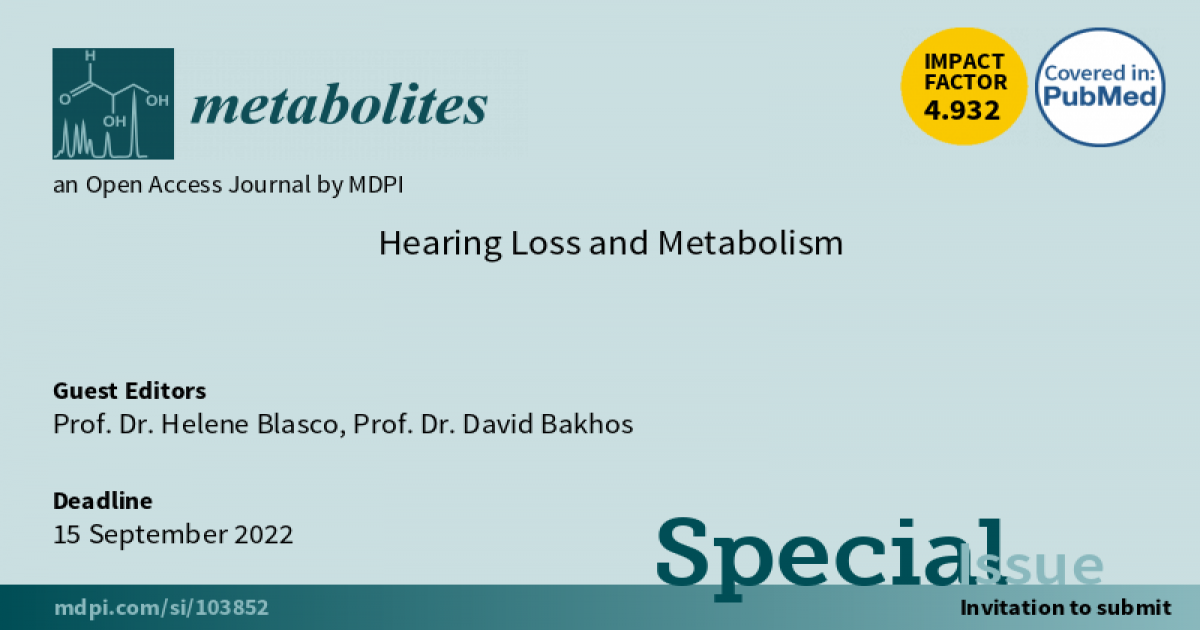Hearing Loss and Metabolism
A special issue of Metabolites (ISSN 2218-1989). This special issue belongs to the section "Integrative Metabolomics".
Deadline for manuscript submissions: closed (15 September 2022) | Viewed by 3753

Special Issue Editors
2. INSERM 1253, iBrain, University of Tours, Inserm, 37000 Tours, France
Interests: metabolomic analysis, amyotrophic lateral sclerosis; biomarkers
Special Issues, Collections and Topics in MDPI journals
2. House Institute Foundation, Los Angeles, CA 90057, USA
3. ENT department, Tours University Hospital, 37000 Tours, France
Interests: hearing loss; biomarkers; pathophysiology; inner ear; auditory rehablitatin
Special Issue Information
Dear Colleagues,
Deafness is the most common sensory deficit. It affects 5.5% of the world's population, with important consequences in daily life. Indeed, the difficulties can range from a delay in the acquisition of oral language in children, to difficulty in oral communication in adults to real social isolation or even depression. The pathophysiological mechanisms leading to deafness are poorly understood, and no biomarkers have been identified in relation to the etiology and/or duration of deafness which are important prognostic factors for the outcome of hearing rehabilitation. The emergence of metabolomics could allow a better understanding of the pathophysiological mechanisms, to identify biomarkers and to propose personalized treatments. This Special Issue of Metabolites titled " Hearing Loss and Ear Fluid Metabolism " is dedicated to metabolomics research on fluid and tissue analysis in ear pathologies. Topics covered in this Issue include sampling and analysis techniques, biomarker identification, improvement of pathophysiological knowledge, data processing and the development of personalized treatment.
Prof. Dr. Helene Blasco
Prof. Dr. David Bakhos
Guest Editors
Manuscript Submission Information
Manuscripts should be submitted online at www.mdpi.com by registering and logging in to this website. Once you are registered, click here to go to the submission form. Manuscripts can be submitted until the deadline. All submissions that pass pre-check are peer-reviewed. Accepted papers will be published continuously in the journal (as soon as accepted) and will be listed together on the special issue website. Research articles, review articles as well as short communications are invited. For planned papers, a title and short abstract (about 250 words) can be sent to the Editorial Office for assessment.
Submitted manuscripts should not have been published previously, nor be under consideration for publication elsewhere (except conference proceedings papers). All manuscripts are thoroughly refereed through a single-blind peer-review process. A guide for authors and other relevant information for submission of manuscripts is available on the Instructions for Authors page. Metabolites is an international peer-reviewed open access monthly journal published by MDPI.
Please visit the Instructions for Authors page before submitting a manuscript. The Article Processing Charge (APC) for publication in this open access journal is 2700 CHF (Swiss Francs). Submitted papers should be well formatted and use good English. Authors may use MDPI's English editing service prior to publication or during author revisions.
Keywords
- Ear
- Hearing loss
- Biomarkers
- Metabolites
- Metabolism
Benefits of Publishing in a Special Issue
- Ease of navigation: Grouping papers by topic helps scholars navigate broad scope journals more efficiently.
- Greater discoverability: Special Issues support the reach and impact of scientific research. Articles in Special Issues are more discoverable and cited more frequently.
- Expansion of research network: Special Issues facilitate connections among authors, fostering scientific collaborations.
- External promotion: Articles in Special Issues are often promoted through the journal's social media, increasing their visibility.
- Reprint: MDPI Books provides the opportunity to republish successful Special Issues in book format, both online and in print.
Further information on MDPI's Special Issue policies can be found here.







